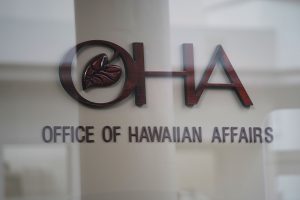Hawaiʻi Supreme Court Rules OHA Trustees Must Follow Ethics Code

UPDATE: In a significant ruling, the Hawaiʻi Supreme Court has confirmed that trustees of the Office of Hawaiian Affairs (OHA) are bound by the state ethics code. This unanimous decision, delivered on October 25, 2023, directly impacts the ethical conduct of these trustees, highlighting the importance of accountability in public office.
The ruling stems from a series of ethics violations linked to former trustee Rowena Akana, who was found to have accepted illegal gifts and misused her trustee allowance, spending it on personal items such as food, television service, and a Hawaiian Airlines Premier Club membership. The court upheld a total of 47 ethics violations against Akana, imposing a hefty $23,000 fine.
Chief Justice Mark Recktenwald emphasized in the opinion that OHA trustees are not exempt from state laws, stating, “OHA is not a political subdivision such that it requires a separate ethics apparatus.” This ruling affirms that the State Ethics Commission, which supervises all state employees’ ethical conduct, indeed has jurisdiction over OHA trustees.
The implications of this ruling are profound, as it reinforces the expectation that all state officials adhere to ethical standards. “No state official is above the public’s expectation for integrity,” stated Wesley Fong, Chair of the State Ethics Commission, expressing satisfaction with the court’s decision.
In defense, Akana’s legal team argued that the Ethics Commission overstepped its bounds, contending that OHA should have its own ethics oversight. However, the Supreme Court clarified that while the Ethics Commission must respect OHA’s internal policies, it retains the authority to enforce the law when necessary.
The court acknowledged the unique role of OHA trustees, allowing for the use of allowances to support beneficiaries in personal development and education—key aspects of their responsibilities that differ from other state boards. “Trustee allowances could be used to support beneficiaries in their personal quest for self-improvement, capacity building, and education,” Recktenwald noted.
This decision marks a crucial step in ensuring that OHA trustees operate transparently and ethically, a requirement that aligns with the office’s mission since its creation in 1978 to improve conditions for Native Hawaiians. The ruling also signals a commitment to uphold public trust in the governance of state employees.
Looking ahead, the OHA Board of Trustees will likely face increased scrutiny regarding their conduct, as the Ethics Commission will continue to enforce its regulations in light of this ruling. The impact of this decision may set a precedent for how other state agencies handle ethical oversight, significantly influencing public administration practices across Hawaiʻi.
As developments continue, the legal community and public will be closely watching any further actions taken by Akana and the OHA following this landmark decision. Stay tuned for more updates on this unfolding story.






